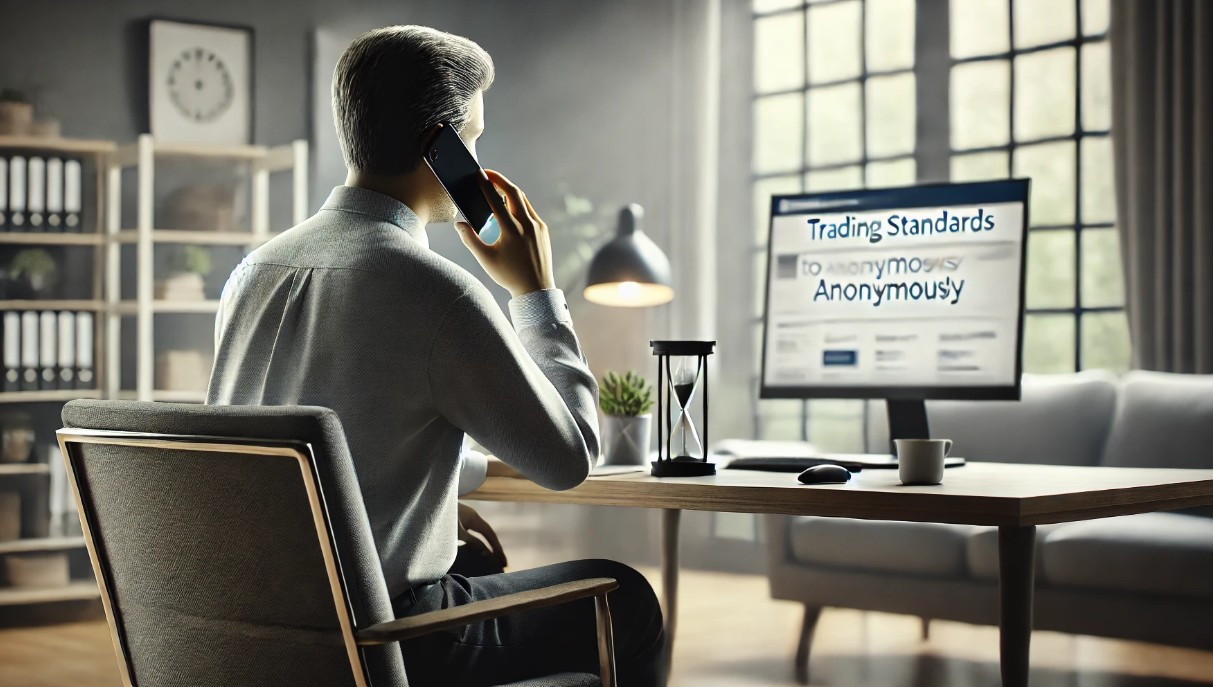Table of Contents
ToggleHave you ever been misled by a company or purchased a product that wasn’t up to standard? Are you wondering how to hold businesses accountable for unfair practices?
Reporting a company to Trading Standards is an essential step in protecting not only your rights but also the wider community from fraudulent or unsafe practices. But when should you report?
What evidence is needed? How does the process work? These are common questions that many consumers face when dealing with unethical companies.
In this guide, we’ll answer these questions and provide a step-by-step explanation on how to report a company to Trading Standards effectively, ensuring your concerns are addressed and your rights are upheld.
What Are Trading Standards and Their Role?

Trading Standards is a government service in the UK responsible for ensuring businesses comply with consumer protection laws and regulations. These departments operate at a local council level and aim to safeguard consumers from unfair trading practices while promoting a fair marketplace for businesses.
Roles and Responsibilities of Trading Standards:
- Consumer Protection: They investigate complaints about faulty goods, misleading advertisements, and unsafe products.
- Business Regulation: They ensure businesses adhere to laws concerning product safety, labeling, and pricing.
- Fair Trading: They address cases of fraud, counterfeit goods, and unethical business practices.
When consumers encounter a problem with a company, such as being sold defective goods or facing misleading sales tactics, Trading Standards can step in.
Their role involves investigating such issues, mediating between consumers and businesses, and, if necessary, taking legal action against companies that violate laws.
In addition, Trading Standards also works proactively by:
- Educating businesses about compliance.
- Raising public awareness about scams and unsafe products.
- Ensuring food standards, weights, and measures are correctly implemented in retail environments.
Understanding their role helps consumers and businesses recognise the value of accountability and trust within the marketplace. If you suspect a company is breaching trading laws, knowing how Trading Standards operates is the first step toward resolving the issue.
When Should You Report a Company to Trading Standards?
Reporting a company to Trading Standards is an important step when a business engages in practices that violate consumer protection laws. Understanding when to take this action ensures that your concerns are valid and can be addressed appropriately.
Situations That Warrant Reporting
- Misleading Advertising: If a company advertises products or services in a way that is deceptive or unclear, such as false discounts or exaggerated claims.
- Faulty or Unsafe Products: When goods are not fit for purpose, pose safety risks, or fail to meet required safety standards.
- Unethical Sales Practices: For example, pressuring customers into purchasing items, hiding fees, or providing incomplete information about a product.
- Counterfeit Goods: Selling fake products disguised as authentic brands.
- Non-Compliance with Product Labeling or Standards: Incorrect labeling on food, electronics, or other consumer products.
- Scams or Fraudulent Activity: Instances where businesses intentionally deceive consumers for financial gain.
Why It’s Crucial to Report?
Reporting these issues isn’t just about resolving your personal grievance, it helps prevent other consumers from facing similar problems. It also encourages businesses to operate ethically and comply with legal requirements.
If you’re unsure about the severity of the issue, organisations like Citizens Advice can provide guidance. They often act as the first point of contact and may escalate your complaint to Trading Standards if deemed appropriate.
By knowing when to report, you contribute to a safer and fairer marketplace for everyone.
What Evidence Do You Need to Report a Company?

When reporting a company to Trading Standards, providing sufficient evidence is crucial to ensure your complaint is taken seriously and investigated thoroughly. Collecting the right information strengthens your case and helps the authorities take appropriate action.
Types of Evidence Required
- Receipts and Invoices: Proof of purchase is vital to show when, where, and what you bought.
- Contracts or Agreements: If the issue involves services, provide any signed contracts or terms and conditions.
- Photographic Evidence: Clear photos of faulty or unsafe products, misleading advertisements, or labels.
- Communication Records: Save emails, letters, or messages exchanged with the business about the issue.
- Witness Statements: If others have experienced similar issues, their testimonies can support your claim.
- Official Reports: For safety issues, such as faulty electronics, reports from technicians or engineers can help.
Tips for Organising Evidence
- Keep everything in chronological order to create a clear timeline of events.
- If submitting digital evidence, ensure the files are accessible and properly labeled.
- Maintain a copy of all documents for your records.
Importance of Evidence
Evidence not only substantiates your claim but also ensures that Trading Standards can act effectively. Without sufficient proof, they may be unable to proceed with an investigation or take legal steps against the company.
By gathering relevant and comprehensive evidence, you make it easier for authorities to assess your complaint and work towards a resolution. If you’re unsure about what constitutes valid evidence, organisations like Citizens Advice can provide guidance before you report.
How to Report a Company to Trading Standards?
If you’ve encountered a company engaging in unfair practices, reporting them to Trading Standards is an essential step to protect yourself and others from similar issues. The process ensures that consumer rights are upheld and holds businesses accountable for violating laws. Below is a detailed guide to navigating the reporting process.
Step 1: Contact Citizens Advice
Before Trading Standards takes action, all complaints must first go through Citizens Advice Consumer Service. Citizens Advice acts as a gateway, providing advice and deciding whether the issue warrants escalation to Trading Standards.
Why contact Citizens Advice?
- They assess the validity of your complaint and determine if it falls within Trading Standards’ remit.
- They provide guidance on your rights and the next steps you can take.
How to reach them?
- Online: Visit the Citizens Advice Consumer Service (https://www.citizensadvice.org.uk/consumer/get-more-help/if-you-need-more-help-about-a-consumer-issue/).
- By phone: Call 0808 223 1133 (for England) or 0808 223 1144 (for Wales).
- If you are in Scotland, contact Advice Direct Scotland at 0808 164 6000.
Citizens Advice will review the information you provide and, if necessary, forward your case to your local Trading Standards office.
Step 2: Prepare Your Evidence
Before making your report, collect all the necessary documentation to support your complaint. Evidence is vital in building a strong case, as Trading Standards requires clear proof to investigate.
Types of evidence to gather
- Receipts and invoices: These show the date, time, and details of your purchase.
- Contracts or written agreements: Particularly important if the issue involves services or recurring payments.
- Photographic proof: Pictures of faulty products, incorrect labeling, or unsafe items.
- Communications: Keep records of all emails, letters, or text messages exchanged with the company.
- Witness accounts: If others are involved or have faced similar issues, their statements can provide additional support.
Organising your evidence
- Create a timeline of events, starting from the purchase date to the complaint submission.
- Use digital folders or a physical binder to categorise your documents for easy access.
Without sufficient evidence, Trading Standards may be unable to proceed, so ensure your case is well-documented.
Step 3: Submit Your Complaint
Once you’ve prepared your evidence, submit the complaint through Citizens Advice. Provide detailed information to ensure your issue is understood clearly.
What to include in your complaint?
1. Details about the company: The name, address, and contact information of the business.
2. Nature of the problem: Clearly describe what happened. For example:
- Were you sold a faulty product?
- Was the advertisement misleading?
- Were you pressured into a purchase?
3. Resolution attempts: Explain what steps you’ve already taken to resolve the issue directly with the company.
Citizens Advice may also ask for supporting documents, so have them ready to share.
Step 4: Follow Up
After submitting your complaint, Citizens Advice forwards valid cases to Trading Standards. However, it’s important to note that:
- You may not receive direct updates: Trading Standards prioritises cases based on urgency and resource availability.
- They act on serious breaches: Issues involving public safety, fraud, or recurring unethical practices are more likely to be investigated.
While waiting, continue to keep records of any further developments with the company. If necessary, you can follow up with Citizens Advice for additional support.
Key Considerations
- Direct contact with Trading Standards: You cannot contact Trading Standards directly. They act on referrals from Citizens Advice or similar organisations.
- Urgent matters: If your complaint involves unsafe products, scams, or fraudulent activity, it may receive priority treatment.
- Alternative resolutions: In some cases, Citizens Advice may suggest alternative approaches, such as mediation services or seeking compensation through legal action.
By understanding and following this reporting process, you ensure that your concerns are addressed efficiently.
Your action not only resolves your issue but also helps Trading Standards monitor and mitigate unfair practices, creating a safer and more reliable consumer environment.
What Happens After You Report a Company?

Once your complaint is submitted, the process moves to the hands of Trading Standards. They will evaluate the issue and decide on the next steps based on the severity of the complaint and the evidence provided. Understanding what happens after you report ensures transparency and helps you manage your expectations.
Step 1: Initial Assessment
- Case Review: Trading Standards will first assess the details and evidence of your complaint.
- Prioritisation: Complaints involving public safety, fraud, or widespread consumer harm are prioritised.
Step 2: Investigation
If the case warrants further action, Trading Standards may initiate an investigation.
During this phase, they may:
- Inspect the company’s premises.
- Review the company’s products or services.
- Interview the business owners or employees involved.
Step 3: Resolution or Enforcement
If a breach is confirmed, Trading Standards can take several actions, such as:
- Issuing warnings or notices to the business.
- Providing advice to help the business comply with the law.
- Taking legal action, including prosecutions, if the violation is severe.
For less critical issues, they may mediate between you and the company to resolve the problem amicably.
Step 4: Consumer Updates
- You might not always be informed of the investigation’s outcome due to legal confidentiality.
- However, Trading Standards may provide general updates or notify you if further action has been taken.
What to Expect?
- The process can take time, especially for complex cases or those requiring legal proceedings.
- Your complaint contributes to building evidence against unethical businesses, even if immediate action isn’t possible.
By understanding the post-reporting process, you can appreciate the role Trading Standards plays in protecting consumers and ensuring fair business practices.
Can You Report a Company Anonymously to Trading Standards?
You can report a company anonymously to Trading Standards, though there are some considerations to keep in mind. Anonymity can protect individuals who fear retaliation from businesses or other parties, but it may also limit how the authorities handle your case.
Reporting Anonymously
1. Through Citizens Advice
- When reporting via Citizens Advice, you can choose not to disclose your personal details.
- Simply inform the advisor that you wish to remain anonymous, and they will forward your complaint to Trading Standards without revealing your identity.
2. Using Anonymous Reporting Tools
- Some local councils or organisations offer online reporting tools where you can submit concerns without providing personal information.
- These systems are designed to handle anonymous complaints effectively.
3. Considerations for Anonymous Reporting
- Evidence Requirements: Trading Standards still require detailed evidence to act on your report. Without direct follow-up from you, they may face challenges gathering additional information.
- Outcome Transparency: When you report anonymously, you won’t receive updates or outcomes about the investigation.
- Critical Issues: For serious concerns, like unsafe products or fraudulent practices, anonymity doesn’t hinder immediate action, as public safety takes precedence.
Alternatives to Anonymity
If you’re hesitant about sharing your identity, you can:
- Use third-party advocates like Citizens Advice to act as a buffer between you and Trading Standards.
- Seek guidance anonymously first, then decide whether to reveal your identity later.
Reporting anonymously ensures that concerns can still be addressed without compromising your safety. However, being open where possible allows for better follow-ups and stronger case handling.
Are There Any Fees Involved in Reporting to Trading Standards?

There are no fees involved when you report a company to Trading Standards. This service is funded by local councils and designed to assist consumers and businesses without any direct costs to the individual filing the complaint.
Why Is Reporting Free?
Public Service Mandate: Trading Standards operates as a government service aimed at protecting consumers and ensuring fair business practices. The service is funded through local council budgets and taxpayer contributions, making it accessible to everyone.
Encouraging Consumer Protection: Charging a fee could discourage people from reporting unethical or unsafe practices, which could harm public safety and market fairness. By offering free services, Trading Standards ensures that all consumers, regardless of financial status, can seek assistance.
Potential Costs You May Encounter: While the reporting process itself is free, you might encounter incidental costs, such as:
- Obtaining professional evaluations or repairs to support your case (e.g., an engineer’s report for faulty products).
- Legal fees if you decide to pursue the company through civil courts instead of relying solely on Trading Standards.
Free Support Resources
If you’re concerned about additional costs:
- Citizens Advice provides free guidance and helps you navigate the reporting process.
- Local Trading Standards offices may offer advice without charge.
By ensuring that reporting remains free, the system empowers consumers to speak out against unfair practices, promoting accountability in businesses without financial barriers.
What Common Issues Can Be Reported to Trading Standards?
Trading Standards addresses a wide range of issues that affect consumers and businesses. Knowing the types of complaints they handle ensures you report problems appropriately and to the correct authority.
Common Issues You Can Report
- Faulty or Unsafe Products: Goods that do not meet safety standards, such as dangerous electrical items or children’s toys with small parts that pose choking hazards.
- Misleading Advertising: Claims about products or services that are exaggerated, false, or deceptive. For example, discounts that aren’t genuine or false health claims on products.
- Counterfeit Goods: Items sold as genuine branded products but are fake, such as counterfeit clothing, electronics, or cosmetics.
- Unfair Trading Practices: Pressurising customers into buying, hiding fees, or refusing to honour refund or exchange policies.
- Scams and Fraudulent Activities: Fraudulent businesses engaging in scams such as fake investments, non-delivery of paid products, or phishing schemes.
- Food Safety Violations: Issues like unhygienic food preparation, expired products sold as fresh, or mislabelled food items.
- Non-Compliance with Weights and Measures: Retailers selling goods with incorrect weights, measures, or pricing, such as underfilled packaged goods or inaccurate fuel pumps.
Why Reporting Is Important?
- Protects other consumers from facing similar problems.
- Encourages businesses to maintain ethical practices.
- Helps authorities identify repeat offenders and take enforcement actions.
If your issue doesn’t fit within these categories, organisations like Citizens Advice can help determine whether it falls under Trading Standards’ jurisdiction or another regulatory body.
How Can You Find Your Local Trading Standards Office?

To report a company or seek guidance, you may need to contact your local Trading Standards office. These offices operate at the council level and handle complaints specific to their region. Finding the right office ensures your complaint is directed to the correct authority.
Steps to Locate Your Local Trading Standards Office
1. Use the GOV.UK Website
- The official UK government website provides a simple tool to find your local Trading Standards office.
- Visit Find Your Local Trading Standards Office (https://www.gov.uk/find-local-trading-standards-office).
- Enter your postcode, and the tool will display the relevant contact details.
2. Contact Citizens Advice
- Citizens Advice acts as a liaison and will forward your complaint to the appropriate Trading Standards office.
- You can reach them via their helpline or online portal to get guidance.
3. Check Local Council Websites
- Most councils have dedicated Trading Standards pages.
- Visit your council’s website and look for the Trading Standards section under “Consumer Protection” or “Business Support.”
Information You’ll Receive
- Office address and contact details.
- Instructions for submitting complaints or inquiries.
- Links to additional resources related to consumer rights.
Why Finding the Correct Office Matters
Trading Standards offices operate independently within their jurisdictions. Reporting to the wrong office may delay your case, as it will need to be redirected.
By ensuring you contact the appropriate office, you expedite the process of resolving your complaint and contribute to maintaining fair practices in your local area.
What Are Alternative Ways to Resolve Consumer Complaints?
While reporting to Trading Standards is a key step in addressing serious issues, there are other methods to resolve consumer complaints. Exploring these alternatives can help you achieve quicker or more specific resolutions, especially for less critical problems.
Alternative Approaches to Resolve Complaints
1. Contact the Company Directly
Most issues can often be resolved by discussing the problem directly with the business.
Steps to take:
- Speak to the customer service department.
- Provide clear details about the issue and the resolution you’re seeking.
- Keep records of all communication, including emails or written correspondence.
2. Use an Alternative Dispute Resolution (ADR) Scheme
ADR schemes are independent services that help consumers and businesses resolve disputes without going to court. Common types of ADR include mediation and arbitration.
Examples:
- The Financial Ombudsman Service for financial disputes.
- The Consumer Ombudsman for general goods and services.
Reach Out to an Ombudsman
- Ombudsman services specialise in resolving complaints for specific sectors, such as energy, telecommunications, or travel.
- If the company is part of an ombudsman scheme, you can escalate your complaint after exhausting the company’s internal process.
Seek Help from Citizens Advice
- Citizens Advice can provide free guidance on resolving disputes and may advise alternative methods before escalating to Trading Standards.
Consider Small Claims Court
- If your issue involves financial loss and no resolution is reached, the small claims court can help recover money owed to you.
- This option is ideal for straightforward cases involving amounts under £10,000 in England and Wales.
Why Alternatives Matter?
- They can often resolve disputes faster than formal investigations.
- Some options, like ADR, allow for flexible solutions that Trading Standards might not provide.
Exploring these methods before or alongside contacting Trading Standards ensures you’re fully utilising the resources available for resolving consumer disputes effectively.
Conclusion
Reporting a company to Trading Standards is a crucial step in safeguarding your rights as a consumer and maintaining a fair marketplace. By knowing when and how to report, gathering the right evidence, and understanding the process, you can ensure your concerns are addressed effectively.
Whether you face issues with faulty products, misleading advertising, or unethical practices, taking action helps protect others from similar experiences. Remember, support from Citizens Advice and alternative dispute resolution methods can also help resolve complaints.
Your voice matters in holding businesses accountable and promoting ethical practices. Together, consumers and regulatory bodies like Trading Standards play a vital role in creating a safer, fairer trading environment for everyone.
FAQ
Can I report a company directly to Trading Standards?
No, you cannot report directly to Trading Standards. Complaints must first go through Citizens Advice, which forwards valid cases to Trading Standards.
What types of complaints does Trading Standards handle?
They handle issues like faulty goods, misleading advertisements, unsafe products, counterfeit items, and unfair trading practices.
Do I need to provide evidence when filing a report?
Yes, evidence like receipts, contracts, photographs, and communication records strengthens your case and supports the investigation.
Can I report a company if I don’t have proof of purchase?
Yes, you can still report, but having proof increases the likelihood of a successful investigation by Trading Standards.
How long does Trading Standards take to act on a complaint?
The timeframe varies based on the case’s complexity, but urgent issues like unsafe products are prioritised for immediate action.
Will I be updated on the investigation’s progress?
Not always. Due to confidentiality, Trading Standards might not provide updates but will take necessary actions if needed.
Can businesses face legal action from Trading Standards?
Yes, Trading Standards can take legal action, issue fines, or prosecute companies found violating laws.
Is the reporting process confidential?
Yes, your details are kept private, and you can also choose to report anonymously through Citizens Advice.
Can I withdraw my complaint after submitting it?
Yes, you can, but if the issue involves public safety, Trading Standards might still proceed with the investigation.
Are there other agencies besides Trading Standards for consumer issues?
Yes, sector-specific ombudsman services and ADR schemes can also help resolve consumer disputes effectively.




